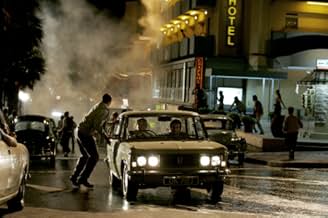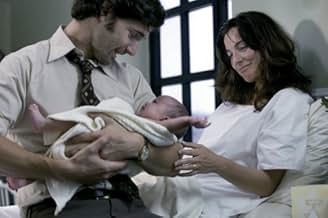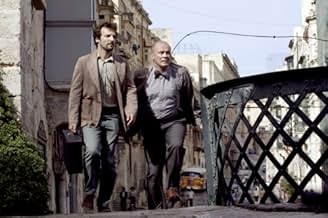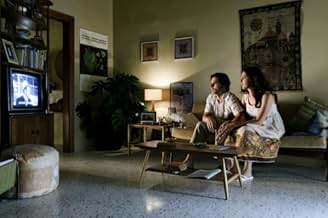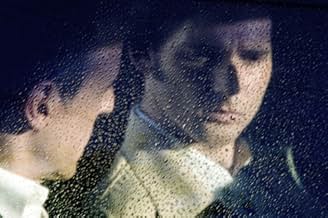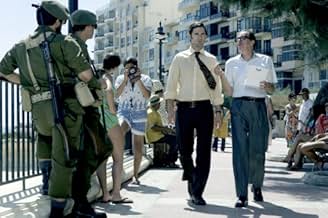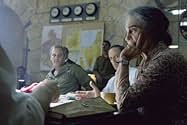Basato su una storia vera all'indomani del Settembre Nero, è la storia dei cinque uomini scelti per eliminare i responsabili di quel terribile giorno.Basato su una storia vera all'indomani del Settembre Nero, è la storia dei cinque uomini scelti per eliminare i responsabili di quel terribile giorno.Basato su una storia vera all'indomani del Settembre Nero, è la storia dei cinque uomini scelti per eliminare i responsabili di quel terribile giorno.
- Regia
- Sceneggiatura
- Star
- Candidato a 5 Oscar
- 14 vittorie e 75 candidature totali
Marie-Josée Croze
- Jeanette the Dutch Assassin
- (as Marie-Josee Croze)
Valeria Bruni Tedeschi
- Sylvie
- (as Valéria Bruni Tedeschi)
Amos Lavi
- General Yariv
- (as Amos Lavie)
Recensioni in evidenza
'Munich' is, on the whole, a straight forward hit-man movie. The assignments are handed out; the team is assembled, each with their own specialty; and they travel about Europe plotting and carrying out their hits. We have the inevitable paranoia, the double agents and suspicious loyalties. So far, so familiar. Only 'Munich' is wrapped in the thin veneer of 'history' and 'fact', and mob bosses and corporate espionage is replaced with Middle Eastern politics and Israeli-Arab relations. I mention this because the politics of 'Munich' are really nothing more than a topical plot devise, used the same way as cold-war relations and soviet villainy was used thirty years ago.
What prevents 'Munich' becoming just a generic updated-cold-war thriller, is the sheer quality of the production. From the flawless recreation of European capitals in the early seventies to the impeccable costume design to the beautiful cinematography 'Munich' is a visually fascinating movie. The performances are universally outstanding, with Bana in particular bringing a sense of tough nobility that seems to be his forte. The script is intelligent and thought-provoking, and it is Kushner's focus on the emotional and psychological landscape of his characters rather than the details of political contract killing, that ultimately lifts the movie above the generic. The kind of self-consciously poetic prose for which he is known, so often seeming unrealistically erudite, is kept to a minimum, and when it does appear, is so beautifully written and performed that all reservations are forgotten.
Ultimately, the greatest praise must be reserved for Spielberg, who has, with 'Munich', created perhaps the first truly adult movie of his career. We see no signs of his trademark sentimentality, his descents into fantasy, his childish simplification of motivation. With 'Munich', he embraces ambiguity and complexity, and as a result, has invited criticism from those who prefer their drama simplistically black and white. Above all, one can't help but wonder what the Spielberg oeuvre would look had he not dedicated his career to kid's movies, fantasies and feel-good sci-fi.
'Munich' is an intelligent and gripping thriller that is a major contender for award recognition, and deservedly so. An outstanding achievement.
What prevents 'Munich' becoming just a generic updated-cold-war thriller, is the sheer quality of the production. From the flawless recreation of European capitals in the early seventies to the impeccable costume design to the beautiful cinematography 'Munich' is a visually fascinating movie. The performances are universally outstanding, with Bana in particular bringing a sense of tough nobility that seems to be his forte. The script is intelligent and thought-provoking, and it is Kushner's focus on the emotional and psychological landscape of his characters rather than the details of political contract killing, that ultimately lifts the movie above the generic. The kind of self-consciously poetic prose for which he is known, so often seeming unrealistically erudite, is kept to a minimum, and when it does appear, is so beautifully written and performed that all reservations are forgotten.
Ultimately, the greatest praise must be reserved for Spielberg, who has, with 'Munich', created perhaps the first truly adult movie of his career. We see no signs of his trademark sentimentality, his descents into fantasy, his childish simplification of motivation. With 'Munich', he embraces ambiguity and complexity, and as a result, has invited criticism from those who prefer their drama simplistically black and white. Above all, one can't help but wonder what the Spielberg oeuvre would look had he not dedicated his career to kid's movies, fantasies and feel-good sci-fi.
'Munich' is an intelligent and gripping thriller that is a major contender for award recognition, and deservedly so. An outstanding achievement.
Gandhi said, "An eye for an eye only makes the whole world blind." What distinguishes justice from vengeance? This echoes throughout Steven Spielberg's "Munich". "Munich" is powerful and perhaps Spielberg's most compelling and thought provoking work. He weaves a tapestry of political and social threads focusing on terrorism and the cost of violence. "Munich" is truly amazing in balancing linear storytelling and horrific acts of violence, demonstrating the impact of the aftermath. Spielberg's "Munich" seen through the eyes of Eric Bana's Avner is a powerful allegory that even in the most just and noble fights against terror we eventually become that which we despise. "Munich" really serves as a reminder. Mossad team leader Avner played by Eric Bana is absolutely riveting as the man who begins this righteous cause only to find that the cost is his soul. Anver asks, "When does it ever end?"
At the 1972 Olympic Games in Munich, Palestinian terrorists brutally murdered the Israeli wrestling team. This political statement was seen around the world and depicted in gory detail by Director Spielberg. Based on the book "Vengeance" by George Jones, the screenplay by Tony Kushner and Eric Roth tells the story of the aftermath of this tragedy. A great Lynn Cohen who plays Prime Minister Golda Meir says, "Every civilization finds it necessary to negotiate compromises with its own values." Poetic words for what follows are a search and destroy mission. The Mossad assembles a team lead by Avner (Bana) to track down and kill with extreme prejudice all those involved in the terrorist action in Munich. 11 names are identified for execution. These executions are also intended to serve as statements. Anver though an inexperienced operative and not an assassin is selected for the covert mission by Ephriam (the great Geoffrey Rush) for being a strong and effective leader of men. The assassin team is composed of Steve (Daniel Craigthe next James Bond), Carl (Ciaran Hinds), Robert (Mathieu Kassovitz), and Hans (Hanns Zischler). They are dissociated from the Mossad, i.e. they technically don't exist.
In accepting the lead, Avner must leave his beautiful and pregnant wife Daphna (a very strong Ayelet Zorer) for what could be a number of years. Carl has his doubts about Avner, telling him that he was chosen because he is a "good soldier". Soon Carl respects Avner for his quiet force and conscience. Attack of conscience and paranoia soon engulf the team as they become entrenched in the world of underground intelligence for hire. Avner pays large sums of money for information on the whereabouts of his targets from Louis (wonderfully shady Mathiew Amalric) and his wealthy Papa (weary and noble Michael Lonsdale). Avner soon finds that whomever he kills is eventually replaced, and that he and potentially his family is now a target for the terrorists he was assigned to hunt down and kill. The realization is that it truly never ends. Bana is amazing as a trapped animal in the scene in his thrashed apartmentsearching for weapons of his demise. Paranoia sets in, and the path of justice and vengeance become blurred. In a poignant scene Robert pleads to Avner, "When I lose my righteousness, I lose everything "
Nothing about "Munich" is easy, though it is simple. I believe that is Steven Spielberg's intention. "Munich" could be tighter in spots, though this does not diminish the movie's power and impact. Eric Bana emerges as the noble hero battling to salvage his own humanity and his very soul. "When does it ever end?" Perhaps even in the current context there is no real answermaybe what Spielberg is getting at. It is a reminder of our humanity, that even the most righteous cause may cost our souls. "Munich" is truly a powerful movie worth seeing.
At the 1972 Olympic Games in Munich, Palestinian terrorists brutally murdered the Israeli wrestling team. This political statement was seen around the world and depicted in gory detail by Director Spielberg. Based on the book "Vengeance" by George Jones, the screenplay by Tony Kushner and Eric Roth tells the story of the aftermath of this tragedy. A great Lynn Cohen who plays Prime Minister Golda Meir says, "Every civilization finds it necessary to negotiate compromises with its own values." Poetic words for what follows are a search and destroy mission. The Mossad assembles a team lead by Avner (Bana) to track down and kill with extreme prejudice all those involved in the terrorist action in Munich. 11 names are identified for execution. These executions are also intended to serve as statements. Anver though an inexperienced operative and not an assassin is selected for the covert mission by Ephriam (the great Geoffrey Rush) for being a strong and effective leader of men. The assassin team is composed of Steve (Daniel Craigthe next James Bond), Carl (Ciaran Hinds), Robert (Mathieu Kassovitz), and Hans (Hanns Zischler). They are dissociated from the Mossad, i.e. they technically don't exist.
In accepting the lead, Avner must leave his beautiful and pregnant wife Daphna (a very strong Ayelet Zorer) for what could be a number of years. Carl has his doubts about Avner, telling him that he was chosen because he is a "good soldier". Soon Carl respects Avner for his quiet force and conscience. Attack of conscience and paranoia soon engulf the team as they become entrenched in the world of underground intelligence for hire. Avner pays large sums of money for information on the whereabouts of his targets from Louis (wonderfully shady Mathiew Amalric) and his wealthy Papa (weary and noble Michael Lonsdale). Avner soon finds that whomever he kills is eventually replaced, and that he and potentially his family is now a target for the terrorists he was assigned to hunt down and kill. The realization is that it truly never ends. Bana is amazing as a trapped animal in the scene in his thrashed apartmentsearching for weapons of his demise. Paranoia sets in, and the path of justice and vengeance become blurred. In a poignant scene Robert pleads to Avner, "When I lose my righteousness, I lose everything "
Nothing about "Munich" is easy, though it is simple. I believe that is Steven Spielberg's intention. "Munich" could be tighter in spots, though this does not diminish the movie's power and impact. Eric Bana emerges as the noble hero battling to salvage his own humanity and his very soul. "When does it ever end?" Perhaps even in the current context there is no real answermaybe what Spielberg is getting at. It is a reminder of our humanity, that even the most righteous cause may cost our souls. "Munich" is truly a powerful movie worth seeing.
Another dip in the Spielberg pool and I come away drenched in emotion. I was a freshman in high school in Texas during the Munich games. I was stunned by the events and understood little.
Today, I am still stunned by Munich and every terrorist act that followed, but I understand so much more and grieve. Spielberg gives us a powerful glimpse into the meaning of home, family, honor, history, ethics, and faith. The movie is not about the Jews and Arabs. It's about human beings. It's about us.
The narrative is driven by our connection to Avner. We watch as Eric Bana opens himself up in a way that the likes of a George Clooney in Syriana only dreams of.
This is a must see.
Today, I am still stunned by Munich and every terrorist act that followed, but I understand so much more and grieve. Spielberg gives us a powerful glimpse into the meaning of home, family, honor, history, ethics, and faith. The movie is not about the Jews and Arabs. It's about human beings. It's about us.
The narrative is driven by our connection to Avner. We watch as Eric Bana opens himself up in a way that the likes of a George Clooney in Syriana only dreams of.
This is a must see.
Ever since he has journeyed into serious films (starting with "Empire of the Sun" and then "Schindler's List"), Steven Spielberg has been searching for a method of making violence unattractive to moviegoers. "Schindler's List" was, of course, shocking, but this first attempt at strong violence did not quite have the intended effect. I know that a lot of people (including me) feel saddened by the film, but SL's violence could seem distant at times, like the audience was merely an observer. "Saving Private Ryan" was the second great attempt at making moviegoers detest violence, but this seemed easily dismissed as a war film, showing events that would probably never happen again, like showing violence in a distant universe. Munich is his latest effort, and it shows Spielberg's feeling that his previous films, although progressive, had not quite 'hit the mark'.
The violence shown in Munich is, perhaps, the most brutal realistically intentioned violence ever shown on film. I say 'realistically intentioned' because, like the average moviegoer, I have not witnessed people getting shot or blown up, so I don't know what those events would actually look like. There are many signs in the film that Spieberg is trying to improve on his earlier efforts. The guns in the film are REALLY loud when fired. This has the effect of putting you in the fight, making it more intimate when someone IS shot. The bullet wounds and remains after explosions are quite gruesome. When someone dies in this film, no matter what side they are on, you feel no happiness, no relief or awe. You feel a sense of death, nothing dramatic, just blank and empty. For this reason, Munich is one of the most important films to have come out, and perhaps it is Spielberg's best ('Raiders' is too superhuman to be included on that list). Spielberg deserves the best director for this one.
The violence shown in Munich is, perhaps, the most brutal realistically intentioned violence ever shown on film. I say 'realistically intentioned' because, like the average moviegoer, I have not witnessed people getting shot or blown up, so I don't know what those events would actually look like. There are many signs in the film that Spieberg is trying to improve on his earlier efforts. The guns in the film are REALLY loud when fired. This has the effect of putting you in the fight, making it more intimate when someone IS shot. The bullet wounds and remains after explosions are quite gruesome. When someone dies in this film, no matter what side they are on, you feel no happiness, no relief or awe. You feel a sense of death, nothing dramatic, just blank and empty. For this reason, Munich is one of the most important films to have come out, and perhaps it is Spielberg's best ('Raiders' is too superhuman to be included on that list). Spielberg deserves the best director for this one.
This movie relates more than just a story of "Vengeance". Besides proving that killing begets killing - it consists of numerous fine details that reveal the hard work done at getting to the depth of things:
For instance, only characters that get shot in the head slump to the ground. The rest take time to die - they walk a few steps, spurt blood and express a look of helplessness and inevitability before going out. Yes its horrifying to look at, which is the point, but it is also real.
Every character is different, and though common in their desire for vengeance, their temperaments are clearly distinguishable in the way the hit men approach their task. Even the terrorists are not stereotyped into hysterical, screaming lunatics. They range from the visibly nervous to the cool Abu Salameh with the movie star style. They are poets, intellectuals and guerrillas each with his story of the conflict. They speak passionately about home - a recurring theme, along with "family". Moreover, Spielberg does not attempt to mitigate the grotesque manner of their deaths, for the blood of the targeted men flows as freely as that of their victims - and when they are blown up, their body parts dangle from ceiling fans. You are not here to feel satisfaction over anyone's death, Spielberg says to the audience. Or as Caine would say in Kung Fu: "The taking of a life does no one honour."
There are no easy "shoot-em-dead" eliminations. There are neighbors, bystanders and obstacles that must be avoided and protected - with variable success. Innocent people may be harmed - and one has to live with that.
There are no mathematical certainties about the potential damage a bomb will cause.
Perspectives and convictions can change, sometimes regrettably. "Don't think about it - just do it" says Avner at one stage when a member of the team expresses doubts about a target's guilt. But at the end he wants evidence that the men he despatched were justifiably killed. Implausible? No; it is only when he has been reunited with his family and experiences the affection of wife and child that he allows himself to reflect from a different perspective - their targets had families too - what if he had killed the wrong men?
The paranoia that permeates the world of spies and assassins is built up gradually - to the point where every survivor mistrusts everybody else. One is doomed all one's life to walk with ears strained for following footsteps. The length of the movie creates the right atmosphere for this idea.
The end dissatisfies many because they would like a reassurance, a note of optimistic finality - but Spielberg rightly offers none. It would be dishonest of him to offer a false but comforting illusion.
It is interesting to contrast this movie with "Paradise Now" that has no violence, a modest budget, and views the conflict from the Palestinian camp. Both narrate completely different stories - yet, in their respective ways, both humanize their subjects, defuse myths about glory, and arrive at the same conclusion: "There's no peace at the end of this."
For instance, only characters that get shot in the head slump to the ground. The rest take time to die - they walk a few steps, spurt blood and express a look of helplessness and inevitability before going out. Yes its horrifying to look at, which is the point, but it is also real.
Every character is different, and though common in their desire for vengeance, their temperaments are clearly distinguishable in the way the hit men approach their task. Even the terrorists are not stereotyped into hysterical, screaming lunatics. They range from the visibly nervous to the cool Abu Salameh with the movie star style. They are poets, intellectuals and guerrillas each with his story of the conflict. They speak passionately about home - a recurring theme, along with "family". Moreover, Spielberg does not attempt to mitigate the grotesque manner of their deaths, for the blood of the targeted men flows as freely as that of their victims - and when they are blown up, their body parts dangle from ceiling fans. You are not here to feel satisfaction over anyone's death, Spielberg says to the audience. Or as Caine would say in Kung Fu: "The taking of a life does no one honour."
There are no easy "shoot-em-dead" eliminations. There are neighbors, bystanders and obstacles that must be avoided and protected - with variable success. Innocent people may be harmed - and one has to live with that.
There are no mathematical certainties about the potential damage a bomb will cause.
Perspectives and convictions can change, sometimes regrettably. "Don't think about it - just do it" says Avner at one stage when a member of the team expresses doubts about a target's guilt. But at the end he wants evidence that the men he despatched were justifiably killed. Implausible? No; it is only when he has been reunited with his family and experiences the affection of wife and child that he allows himself to reflect from a different perspective - their targets had families too - what if he had killed the wrong men?
The paranoia that permeates the world of spies and assassins is built up gradually - to the point where every survivor mistrusts everybody else. One is doomed all one's life to walk with ears strained for following footsteps. The length of the movie creates the right atmosphere for this idea.
The end dissatisfies many because they would like a reassurance, a note of optimistic finality - but Spielberg rightly offers none. It would be dishonest of him to offer a false but comforting illusion.
It is interesting to contrast this movie with "Paradise Now" that has no violence, a modest budget, and views the conflict from the Palestinian camp. Both narrate completely different stories - yet, in their respective ways, both humanize their subjects, defuse myths about glory, and arrive at the same conclusion: "There's no peace at the end of this."
Lo sapevi?
- QuizGuri Weinberg played his own father. He is the son of Moshe Weinberg, the Israeli wrestling referee and former champion, who died in the massacre when Guri was just one month old.
- BlooperThough they took the time to digitally add the World Trade Center to the final shot, they didn't edit out the Citigroup Center, Trump World Tower, and the Bloomberg building, which were built after the time of the movie.
- Versioni alternativeThe film was heavily censored in Malaysia for a 'U' rating. The uncut version is rated '18PL'.
- ConnessioniFeatured in Today: Episodio datato 27 luglio 2005 (2005)
- Colonne sonoreAin't No Sunshine
Written & Performed by Bill Withers
Courtesy of Columbia Reecords
By Arrangement with Sony BMG Music Entertainment
I più visti
Accedi per valutare e creare un elenco di titoli salvati per ottenere consigli personalizzati
Dettagli
- Data di uscita
- Paesi di origine
- Lingue
- Celebre anche come
- Untitled 1972 Munich Olympics Project
- Luoghi delle riprese
- Bugibba, Malta(Olympic Hotel in Cyprus)
- Aziende produttrici
- Vedi altri crediti dell’azienda su IMDbPro
Botteghino
- Budget
- 70.000.000 USD (previsto)
- Lordo Stati Uniti e Canada
- 47.403.685 USD
- Fine settimana di apertura Stati Uniti e Canada
- 4.152.260 USD
- 25 dic 2005
- Lordo in tutto il mondo
- 130.982.407 USD
- Tempo di esecuzione2 ore 44 minuti
- Colore
- Mix di suoni
- Proporzioni
- 2.35 : 1
Contribuisci a questa pagina
Suggerisci una modifica o aggiungi i contenuti mancanti


